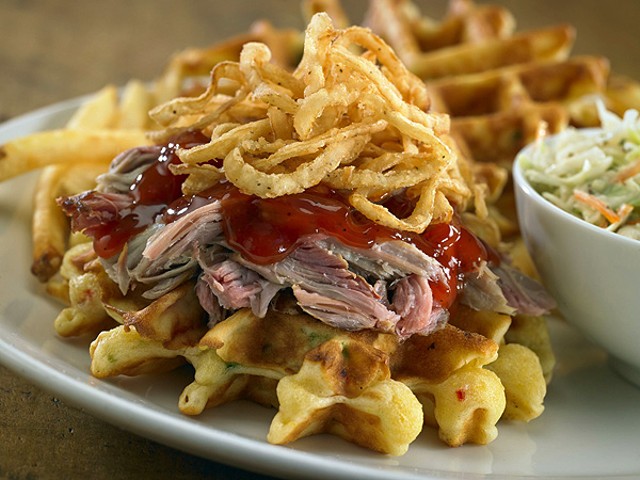Over the last few years, as the local artisanal food movement has gained steam, we've seen it all: craft beers, small-batch vodkas, artisanal sweet potato pie, from-scratch marshmallows, foraged teas, specialty currant farms.
Just when we thought we'd seen everything, we found a Michigander who makes his own oils.
His name is Ben Cohen, and he's based at Small House Farm, out in Midland County. Originally from Midland, about five years ago, he and his wife Heather sought out a life closer to the land, partly for themselves and partly for their kids. They've built a life for themselves and their two small children on their heavily wooded 3.5-acre farm. And one of their major cash crops has turned out to be oil, which quickly sells when they hit area farmers markets.
Metro Times: It sounds like everything grew out of your search for self-sufficiency.
Ben Cohen: You know, it really started that way, trying to produce our own things. So at one point, I was like, "Well, you know, if we're gonna do this, it'd be really nice if I could mill my own grain. I want to get a grain mill." So, through searching for the grain mill, I came across an oil press! And I thought, "Ah-ha. Let's try that out." And, well. I guess, like they say, the rest is history. I got a hand-turned small machine, it had a little kerosene lamp that produced the heat, and it was produced in Holland. And it was the smallest-batch operation imaginable. You were limited by your own physical capabilities. And it's amazingly difficult — you don't realize that when you go into the grocery store to buy stuff, when you have no idea where your food comes from. But when you're actually taking time to produce it yourself, it's amazing how much work actually goes into something that we would consider such a simple product. It was strenuous, to say the least.
MT: How much work and stock goes into the finished product?
Cohen: It varies dramatically by how dry the seeds are, the humidity of the room, and other factors. I didn't even understand what I was getting into when I started. But, for example, hemp seed oil — that's one of our most popular products — at times, it can take me up to 2 pounds of seeds to make a 4-ounce bottle of oil. And when you're turning it by hand, that's a lot of revolutions, you know? And it's your arm that's creating the force, basically, that gets the job done. You know, I would produce as much oil as I possibly could, I'd be up all night sometimes making sunflower oil and things to take to the farmers market, and I'd show up with six bottles or something. And I'd sell out in two hours. It was exciting, but you can only get so far there. It was very limited.
MT: So have you moved beyond the crank now?
Cohen: We have. We upgraded six or seven months ago to an electric expeller press. So, technically, the oils we produce are cold-pressed oils. Heat really breaks down the oil. It gives it a shorter shelf life; sometimes it can affect the nutritional value. You know, so cold-pressed oils, there's very, very little heat involved at all — just enough to help pull the oils out of the material. So it keeps it in its most raw form. But now with the expeller press, we're able to keep up a little bit with the demand. I couldn't physically keep up, you know? Which I guess is a good problem to have when you're in business. Everything we do is still in small batches, though, because of my limited ability to produce, and also because it's very important to me that these people get the freshest oil possible.
MT: So what kind of customer goes out for small-batch oil?
Cohen: We get a wide variety of customers. We have some folks who I think are really just in it to support local. They really want to buy a locally produced item, where they can meet the person who made it and know exactly where and when it came from. I have some folks that I think just buy it because it's almost a novelty. The Christmas season was incredibly busy for us, because I got so many custom orders from people who were giving our oils as gifts to folks, because it's not something you see every day. You can't go to any farmers market to find somebody doing what we're doing. But [we got] all age ranges, from college kids right up to older folks who are looking for the health benefits of it all. The hemp seed oil, the flax oil, things like that, you know — it's very, very good for you. And a lot people, they're aware of that fact now. And they want to have that. And they understand my oil's the freshest oil you're gonna get. As far nutrition goes, it's at its peak.
MT: Do the flavors and colors stay true in the oils?
Cohen: Yeah. We did a seasonal pumpkin seed oil, and it was delicious. It carried a lot of flavor, and it was a brilliant red color, which is amazing, because the raw seed itself is green. But the oil extracted from it was a beautiful, beautiful red. All the oils have their own distinct color. The sunflower is golden and there's no denying the smell and the flavor of it. The hemp seed is a beautiful, brilliant color, very nutty smell and flavor. The flax has a golden-brown color to it. Sesame is very, very light blond, as is the almond. The almond is the lightest color and the lightest scent too. I'm actually putting together a thing for on our table where I'm gonna bottle all the oils in clear bottles and set 'em up so everyone can see the range of colors. We bottle a lot them in a dark brown glass to keep it out of the light. But gosh, it sure is nice-looking.
For more info, see smallhousefarm.weebly.com. To order from Small House, call 989-708-0549 or email [email protected].





